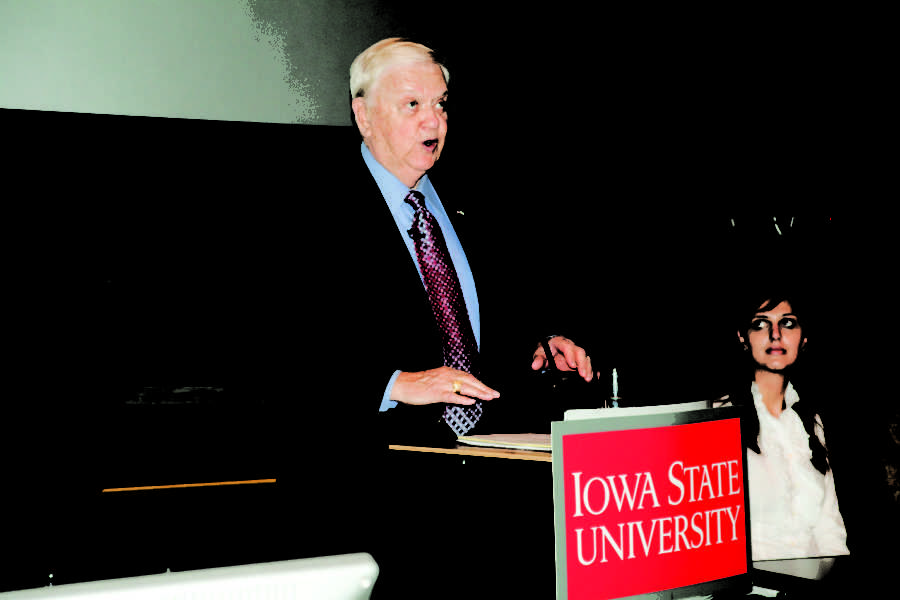Future of agriculture based in sustainability, biodiversity
Photo: Bryan Langfeldt/Iowa State
Orion Samuelson, host of National Farm Report, Samuelson Sez and ‘This Week in Agribusiness’ moderated the panel discussion on sustainable agriculture and biodiversity practices Tuesday in Lee Liu Audtiorium.
October 12, 2010
Science and technology seem to be the answer to conquering sustainability and biodiversity issues in the world.
Hundreds of students, faculty and farmers from the Ames community and around the globe participated in the Global Farmer Town Hall meeting that was held Tuesday morning in Howe Hall. The purpose of the meeting was to bring together people with an interest in agriculture to discuss issues in sustainability and biodiversity.
A panel consisting of three farmers and two experts in the agricultural field, along with Tom Vilsack, secretary of agriculture, answered questions and shared their personal experiences in promoting sustainability and biodiversity in agriculture.
One of the topics panelists agreed upon was that production levels on farms are increasing while the amount of land the crops are produced on remains the same.
Rajesh Kumar, vegetable and cotton farmer from India, said many of the farmers in India have started planting high yielding varieties of seed.
However, small farmers and those in developing countries do not always have access to the science and technology that is required to increase production levels on their farms.
“In Brazil, we have two situations: We have big farmers that have access to technology and biotechnology and we have small farmers that don’t have access, they don’t have knowledge about the environment,” said Camila Illich, crop and tree farmer from Brazil.
Panelists also addressed the topic of sustainability directly.
Gary Munkvold, chairman of the graduate program in seed technology and business at Iowa State, said there are at least three components of sustainability: economic, environment and societal.
“All three of those components are interconnected and we need to pay attention to all three of those whenever we talk about sustainable agriculture,” Munkvold said.
Vilsack suggested another component to sustainability — water. Farmers around the globe need to be aware of water availability, both for the present and the future.
“I think we’re going to be challenged to be able to grow more with less water,” Vilsack said. “We need to figure out how to use water more effectively.”
With an ever-increasing world population, farmers face the challenge of producing enough food to feed the increasing populations. At the same time, farmers must implement practices on their farms that will preserve resources such as land and water for future generations.
“Over the century, farmers have learned to strike a balance between the preservation of the natural environment and the increasing need to feed the world,” said Denise Dewar, executive director of CropLife International.
To further this balance in the coming years, farmers need to take advantage of all the resources available to them.
“This is not about picking one vision for agriculture over another,” Vilsack said. “We must work to ensure that all types of agricultural production can co-exist as we confront the dual challenges of feeding the world while maintaining biodiversity. We must utilize all of the appropriate tools in our tool box.”
Pam Johnson, corn and soybean farmer from central Iowa and panelist, said farmers from around the world are ready to provide the world with the food and resources it needs.
“We are ready to step up to help provide that food and energy that the world needs and that growing populations need and we are ready to do it in a sustainable manner,” Johnson said.
Vilsack closed the session by addressing the students and young audience members who are the future of agriculture.
“You have the capacity to change the world, to save lives, to make a significant mark,” Vilsack said. “I hope that you’re challenged, that you’re passionate, that you’re engaged and enthusiastic about this life because you literally can change the world. There aren’t too many occupations or callings where that is a real possibility, but agriculture is one of them, so I strongly encourage you to stay connected and stay active.”

















